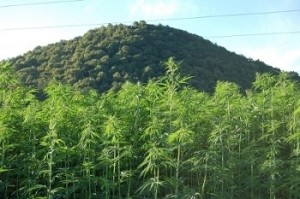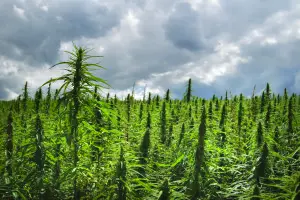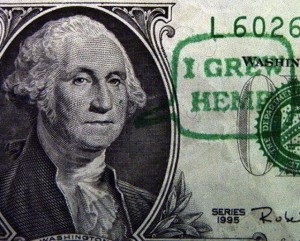By Gary Anderson
Guest Writer for Wake Up World
The world’s financial system is going to disintegrate. Who can say when? Yet we all know it is just a matter of time. A FIAT currency system based on the U.S. dollar with the U.S. government spending itself into oblivion with a global imperial military agenda and expenditure, has to crumble. It is undeniably inevitable. Australia’s financial system is currently joined at the hip with the U.S., and our banks have similarly gone off the gold standard, and been deceived into enormous risk on the speculative paper-based banking system — through which London and Wall St. have subtly been raping the world.
We will have to ease back to a more secure gold and/or silver-based system. Yet even with the gold standard there is a downside. Gold in principle is very sound. It doesn’t degrade or rust. It is rare and will hold value. Yet, despite a few industrial purposes, it is of little practical value. You can’t eat it, keep warm with it, or build with it to add practical value to human life.
Industrial and medicinal hemp is the best of both worlds in that it is stable and durable yet also enormously useful and beneficial. With national industry based on industrial hemp, farmers could have an eternally stable income, and industry would have a constant supply of the earth’s best raw materials.
With complete legalization of medicinal hemp, hemp bud oil could be produced at such a low cost as to be able to save the country (Australia) approximately seventy billion dollars annually, and in conjunction with industrial hemp, produce many hundreds of billions in local industries and exports. We could create an enormous industry and draw millions of the most creative generous people from around the world to our shores, with obvious long-term benefits.
Sustainable and Equitable Distribution
I am highly critical of the divide-and-conquer breach of trust, where the government gives power to the corporations/banks rather than exercising the power to set up structures that create a symbiosis and mutually beneficial relationship between the government, the corporations/banks, we-the-people, and all the individuals within the society.
The fundamental model of the People’s Hemp Bank ensures the enormous wealth and benefit of embracing the earth’s most useful and medicinal plant is sustainably and equitably managed and distributed. We have to create the wealth to invest and expand the hemp-based industries, provide tax to the government to cover all of its costs and more, be generous to workers, give incentive to investment, yet not allow the wealth to ultimately be in the hands of any individual, corporation or government with an excessive profit motive. The hub of the wealth should lie with the people and be used for the benefit of the community and the nation.
Herein are my seed thoughts which I place on the enquiry table, inviting input from others to refine and develop the concept. The figures are just an initial guide to possibility. Yet because of the enormous intrinsic worth of the hemp plant, one can see that there is then ample scope for all people to benefit – from the growers to the processors, retailers, end-users, to those providing capital, and to the government also. There would naturally be a range of prices for industrial hemp materials and medicinal oils based on quality, but to simplify the initial calculations I will only use a single value.

Implied is complete legalization and de-criminalisation of industrial and medicinal hemp – absolutely minimal regulation, like growing sorghum or grapes, or selling alcohol or tobacco. Set up People’s Hemp Bank (NSW) as a starter, with the responsibility of centralizing and managing all hemp materials state-wide, with storage and processing facilities set up regionally. Currently industrial hemp price to growers is $250 per metric ton. I suggest set an initial buying price by the People’s Hemp Bank (PHB) of $300 p/MT with all quality-confirmed production guaranteed to be purchased. This would provide security and extra capital for local growers to develop co-operative processing facilities, which would function hand-in-hand with the PHB and produce high quality textile fabrics, seed oil, fuel, crete, woodchips flour etc. Basic processes. The PHB on-sells at average $370 p/MT to secondary processors and manufacturers.
Manufacturers could be assured of a continuous supply of virtually unlimited quantity of good-quality environmentally sound primary-processed raw materials at a workable consistent price. Given the dynamics of production, market forces and fluctuating costs, prices paid to farmers could rise and fall seasonally, but with the overall intention of harmony working in a oneness paradigm. In contrast to the competitive divide-and-conquer screw-everyone-from-the-top-down paradigm, the price would be always fair and sustainable, and so profitable. The PHB is intended to give a good price to the farmers, but with a free unregulated production and guaranteed sale to the PHB, the price that PHB pays could reduce to current levels or lower and still be a good win for the farmers. The goal would be to be able to supply the industrial hemp materials to processors and manufacturers as cheaply as possible so that their businesses could be quickly viable, generous to employees, and grow to export capability, while not later levering the farmers unfairly. The hemp medicine could feasibly support the industrial so there could be just 10% to 15% markup from farmer to PHB to manufacturer.
We are one country, all needing our whole system to work well. Constant communication, transparency and honesty between all those involved will ensure that the whole country ultimately benefits. If an individual loses his or her job because their industry is no longer needed or viable, initially there will be discomfort, yet if another more useful and purposeful job was offered them, and they could see a great positive transformation of society happening at the same time, surely they would ultimately have a smile on their face. For many the smile would be huge because they have always wanted to move to a country area but have been prevented by employment factors. Now the door is open wide, the opportunity is right in front of them, and the air is very fresh my friends. The Great Southern Land! Oh Yeah!
The PHB purchases medicinal strength hemp buds from specially licensed growers at $3,000 p/MT to cover the extra costs of producing high quality medicinal grade hemp strains and separating the buds. The PHB pays the government $3,000 p/MT in tax. (50% state, 50% federal) If we add $1,500 p/MT for all storage and administration costs, we can say that a realistic cost price to the PHB would be $7,500 p/MT or $7.50 p/KG. (The current black market bulk retail price is $8,000 per kg)
With unlimited production of industrial hemp and licensed medicinal hemp, only those producing medicinal hemp will know which fields it is in, and with raw buds for smoking available legally at a very low cost there would be no need for high security, as the illegal trade would be wiped out. Simultaneously I believe the hard drug trade would be greatly diminished, by availability of low-cost medicinal hemp combined with a social model that functions as a more harmonious unit. Farmers who were licensed to produce medicinal grade hemp would face harsh penalties and lose their license if they traded with anyone other than the PHB. I feel these farmers would be very happy, indeed feel privileged to be a licensed hemp medicine supplier, and the extra profitability of the farming for hemp medicine, though not extraordinary, would encourage the highest quality of production standards and ethical transparency.
The PHB could sell the raw unprocessed buds for $100,000 p/MT ($100 p/KG) to PHB wholesale/retail. PHB W/R pay $100 p/KG in tax. (50% state, 50% federal) A retail price set at $350 p/KG ($10 p/OZ) for unprocessed buds, and $560 p/KG ($16 p/OZ) for the hemp medicine component of all processed products such as cookies, chocolate, drinks. No GST. The retail business makes profit, pays tax. The PHB wholesales raw and processed medicine to selected independent stores, with standardized retail pricing the PHB and independents.
 Hemp oil and hemp oil capsules (10% extraction yield) could be produced by the PHB and held in the medicinal bank, and sold at $1,800 p/KG direct to PHB retail outlets, who pay $700 p/KG tax. (50% state, 50% federal) Retail price to end user would be set at $3,000 p/KG or $3 p/gram. A tonic dose of 0.5 grams per day would be $1.50 p/day, and a highest dose cancer-treatment of 3 grams p/day would cost $9 p/day. (No GST) Given the high profit on medicinal hemp oil, there is extensive scope for subsidy and indeed charity in the supply of hemp oil medicine to disadvantaged people.
Hemp oil and hemp oil capsules (10% extraction yield) could be produced by the PHB and held in the medicinal bank, and sold at $1,800 p/KG direct to PHB retail outlets, who pay $700 p/KG tax. (50% state, 50% federal) Retail price to end user would be set at $3,000 p/KG or $3 p/gram. A tonic dose of 0.5 grams per day would be $1.50 p/day, and a highest dose cancer-treatment of 3 grams p/day would cost $9 p/day. (No GST) Given the high profit on medicinal hemp oil, there is extensive scope for subsidy and indeed charity in the supply of hemp oil medicine to disadvantaged people.
PHB profits would be used on expanding regional storage facilities, research, education, health and happiness building, holistic healing programs, and maintaining the industrial hemp price as low as possible – while still being generous to the farmers. Gold and silver would also be purchased to partially secure the bank with interchangeable currency while hard stocks of industrial and food hemp materials, and medicinal hemp oil are steadily increased. Individuals could deposit funds into the PHB and earn standard interest, yet they would also be able to redeem the deposits for real materials essential and useful.
The PHB could be the nation’s true insurance against the uncertainties of the global financial system. If and when the uncertainties of the greed economy finally hit home, the people of the nation will be able to redeem their investment in real and useful goods such as food, cloth and fibre materials, building materials and hemp-crete, hemp fuel, the earth’s best medicine, seed-stock etc. Individuals could grow their own hemp for personal use. Commercial scale private growing of medicinal hemp would be discouraged because of the low returns, availability at low price, with little enforcement needed. There would be virtually no black market. Given the value of the PHB to the people, the people would be the policers of regulations.
There is plenty of emerging science on the health benefits and medicinal applications of hemp. If the nation’s average use of medicinal hemp bud oil for preventative and curative use was 0.5 gram per day per person, national usage would be 11,500,000 grams x $1.50 x 365 = $6.3 billion per annum. At a rough guess I suggest this would reduce by 1/2 our total personal and governmental expenditure on health, estimated to be $150 billion, being a saving of $75 billion, net $68.7B p.a. We would be healthier, happier, and more productive as a nation. Of this $6.3B the bulk of the residual profit would remain in the hands of the people through the Peoples’ Hemp Bank, with generous taxes paid to state and federal governments, a healthy price paid to farmers, and reasonable retail distribution profits. For Australians who would lose current employment treating disease ineffectively, there would be creative, productive opportunities enhancing community health practices, as well as creating sustainable wealth in industrial or medical hemp production, processing and product manufacturing. This is win-win for everyone, except multinational pharmaceutical companies, and medical technology companies.
Not a difficult decision….
Educational References:
- “Global Hemp Revolution – Decriminalize Cannabis – Industrial Hemp”
- “Run from the Cure – The Rick Simpson Story“
- “Cannabis Rising: The Key In The Lock – Your Health, Your Future”
- “Cannabis – a Documentary (Cinema Libre)”
- “Making a Killing: The Untold Story of Psychotropic Drugging”
- “Strain Hunters India Expedition”
- “Scientific Research and Real Facts about the Cannabinoids in Cannabis”
- “Hidden Secrets of Money (series)
Author’s note:
I haven’t touched on the more delicate issue of protecting children, and the side-effects experienced by a small portion of people. That will take further more complex debate, however the essential points are covered in the documentaries I refer to above. The reader has to make enquiry and do study of their own to share my conclusions passionately. This is such an important issue, every Australian should encourage every other Australian to do the research. I wanted to focus in this article on the big clear issues, so that if the concerns are considered, we remember the total cost of not thinking we are intelligent enough to manage them.
I am also not promoting the smoking of hemp. Hemp oil is an oral medicine. In 1937, 40% of all modern medicines had hemp bud oil in them. Prohibition of hemp oil is simply a measure to protect the profits of the pharmaceutical industry.
In an honest, open, intelligent society surely educating and encouraging the proper use of the most effective natural medicines, able to be grown locally or in-house, is the simplest, most efficiently viable, low cost, most responsible health and well-being approach possible for every family, community and country.
Because of its legal situation, the hugely inflated cost, and a lack of real understanding and education on the matter, the smoking of the medicine in an unrefined state is the reality of current use in our society. As raw buds contain 80-90% non-medically active organic material, for health reasons (legalities aside), it would therefore be preferable for those who currently smoke the raw buds to switch to vapourising oil or resin, or ingest the buds or oil, rather than smoking this material.
About the author:
My past is irrelevant. What matters is whether we can work together to create a better future. Life begins at 60, so some wise ones have said, and I agree in that I now know who I am and can understand this life and my purpose. I am a person who hopes to make a significant difference from here on.
I have a peak concept; The People’s Hemp Bank which I reckon is worthy of intelligent scrutiny and debate. I intend to continue singing and dancing songs of freedom and peace, while educating my audience, collecting signatures for my petitions (in Martin Place Sydney and elsewhere) and progressing my ideas as far as possible, before my journey here ends.
For more information, email Gary Anderson at [email protected]

If you've ever found value in our articles, we'd greatly appreciate your support by purchasing Mindful Meditation Techniques for Kids - A Practical Guide for Adults to Empower Kids with the Gift of Inner Peace and Resilience for Life.
In the spirit of mindfulness, we encourage you to choose the paperback version. Delve into its pages away from screen glare and notifications, allowing yourself to fully immerse in the transformative practices within. The physical book enriches the learning process and serves as a tangible commitment to mindfulness, easily shared among family and friends.
Over the past few years, Wake Up World has faced significant online censorship, impacting our financial ability to stay online. Instead of soliciting donations, we're exploring win-win solutions with our readers to remain financially viable. Moving into book publishing, we hope to secure ongoing funds to continue our mission. With over 8,500 articles published in the past 13 years, we are committed to keeping our content free and accessible to everyone, without resorting to a paywall.







